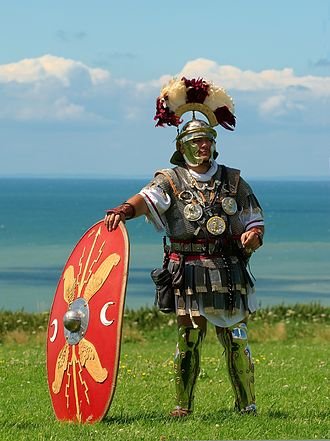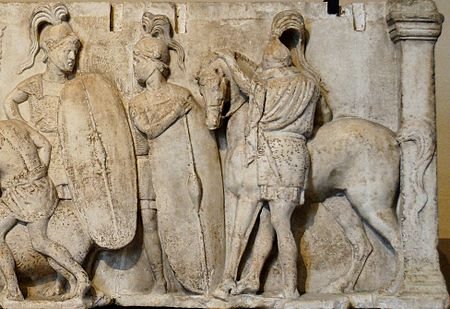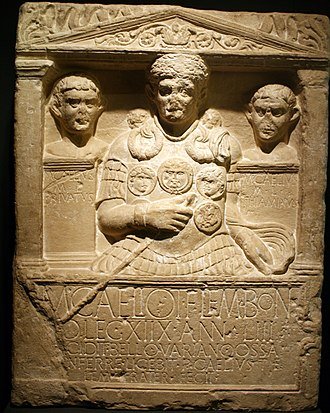The Centurion: Hero of Ancient Rome
Of all the soldiers of ancient Rome, from Hastatus to the Magister Utriusque Militiae, one title stands out above all in the modern consciousness: the Centurion. Just about everybody will have heard the title of Centurion, but just what was a Centurion?

Image by, Luc Viatour, via Wikimedia Commons
The tale of the Centurion begins with the first truly organised armies of ancient Rome and so a short explanation of the origins of Rome and its army is needed for clarity. Rome began with three tribes: the Ramnes, the Tities and the Luceres. Each of these tribes was divided into 10 Curiae (assemblies), each of which supplied 100 warriors for those very early Roman armies. The commander of these hundred men took his name from the Latin for 100 and this man was known as the Centurion. Just how centurions achieved such ranking at this time is impossible to tell, we simply do not have any relevant details in the historical record. It is likely however that a combination of social rank and battle skill were the key factors in common with other tribal societies throughout history.
As time went by and Rome began to expand the armies of Rome needed to be somewhat better organised and more efficient and the Legion (the name is derived from the Latin for levy) was born. In the armies of the late Kingdom and Republican Rome, each year on the Campus Martius (Field of Mars – god of war) the men of Rome with a wealth of 11,000 asses* or greater gathered for the selection (dilectus) of men for military service during that year. Of the men selected for each Legion, as Polybius puts it, 60 of the most deserving were named Centurions by the Consuls for that year.
*Asses were a small bronze coins with a value of 1/10 of a Denarius, not donkeys as it may seem when written in an English text.
The men selected as centurions were all from the lower, plebeian social class and so a social rank had nothing to do with becoming a Centurion, just what was it that made these men “deserving”. Well, in the first place, a Centurion had to be able to read and write, being able to read your orders being important to the generals in command. Secondly, he must also be a man of experience, having seen service with the legions in earlier wars, no youngsters need apply, and finally, which all ancient sources, from Dionysius of Halicarnassus through to the great Julius Caesar himself, agree on, the prospective Centurion must be courageous and have had his acts of valour on the field of battle witnessed and widely respected.

The classic example of the way bravery and deeds of valour were the key to a Centurion's status was the competitive relationship between Titus Pulfio (sometimes called Pullo) and Lucius Vorenus. Ceasar tells of two Centurions of the 11th Legion in Gaul, both wanting to be promoted to the most senior post, that of Primus Pilus (First Spear), they were true and bitter rivals. In a fight at the Legion's fortified camp Pulfio decided to taunt his rival shouting across the rampart, "Why do you hesitate, Varenus?" and "This very day shall decide our disputes." Saying this he put action to words and charged out towards the densest part of the enemy formation. Varenus, not to be outdone charged after him. As he reached Pulfio, Varenus sees that a Gallic javelin has pierced his shield and jammed his sword fast in its scabard; Pulfio is almost helpless. Lending aid to his rival, Varenus draws the attention of the Gauls and quickly kills one warrior and drives the others back for a moment, but in driving the enemy off he lost his footing and fell to the ground at the mercy of the Gauls, mercy that was in short supply just at that point in time. As he is assailed by the Gauls and unable to regain his footing his comrade and rival Pulfio rejoins the fight, having freed his blade, and lays about him causing great carnage. Varenus, managed to regain his feet with the respite that his courageous rival had bought his and then the Gauls discovered, much to their dismay, that if fighting one centurion is bad, fighting two is far, far worse.
Caesar ends by saying that "Fortune so dealt with both in this rivalry and conflict, that the one competitor was a succor and a safeguard to the other, nor could it be determined which of the two appeared worthy of being preferred to the other."
Story and quotes from book 5 of The Gallic Wars, by Julius Caesar
These two Famous Centurions are featured as key protagonists in HBO's TV series Rome. HBO's take on the fight is here: Varenus and Pullo
The Centurions were the heroes of Ancient Rome, they were the foremost warriors of their time, leading their troops by example. This was not all that the Centurion could aspire to, his great experience was valued by his noble (Patrician) superiors and the senior Centurion of a Legion always sat in on a council of war. While heroics were the path to recognition in the Roman world, the experienced and understanding of a battle gained while performing these deeds and staying alive despite the odds was what made the Roman war machine so formidable.
Bibliography:
Ancient Rome, Leslie & Roy Adkins
Armies of the Carthaginian Wars 265-146 BC, Terence Wise
Commentarii de Bello Gallico (The Gallic Wars), Gaius Julius Caesar
Hannibal and the enemies of Rome, Peter Connolly
Roman centurions 753-31 BC, Raffaele D'Amato
Scipio Africanus: Greater Than Napoleon, Sir Basil Liddell Hart
The Complete Roman Army, Adrienne Goldsworthy
The Roman Army, Chris McNab
The Roman Army, Peter Connelly
All images from Wikimedia Commons.


Beep! Beep! This humvee will be patrolling by and assisting new veterans, retirees, and military members here on Steem. @shadow3scalpel will help by upvoting posts from a list of members maintained by @chairborne and responding to any questions replied to this comment.
Many thanks.
great article with excellent bibilography! the fact that Titus Pullo and Lucius Vorenus are historical figures is really interesting.
Roman society and system were truly flexible and opened in some way for non-nobility so extraordinary people always had chance to prove themsleves
Absolutely, the Romans learned and prospered, when they became a more decadent and inward looking society, they were overtaken by disaster. I like the Pullo/Vorenus story, because it shows the strength of the legions, each man was capable of rising by the strength of his arm and the courage in his heart. This is why the Gladiatorial games were seen as civilizing by the Romans, they demonstrated for all to see: courage, strength and honour.
I rembeber one sentece, I think that I've read it in plutarh's biography of Gaius Marius when he said in senat'' All of you have noble ancestors but I belive that they wish that I am theirs descendant-not you '' Real picture of how much an ordinanry man could achive with his talents and personality.
They were open-minded for all good stuff that they were founding in cultures of other nations, just look the Ancient Greeks influence in early Roman religion and the influence of the Greek literature after they conquered the Greeks
There are many Greek influences, but my favourite is the influence of the comedy Lysistrata and how the women of Rome took action when the Senate was trying to outlaw jewelry after the end of the Punic Wars. Women had little power in Roman society, unless of course they actually wanted it. Well perhaps not a direct influence, but the parallel amuses me.
Congratulations @audax! You have completed some achievement on Steemit and have been rewarded with new badge(s) :
Click on any badge to view your own Board of Honor on SteemitBoard.
For more information about SteemitBoard, click here
If you no longer want to receive notifications, reply to this comment with the word
STOPGood information
Truly great and informative post, loved reading it.
Best Regards.